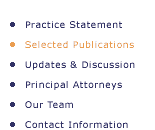
APRIL, 2000
JAPAN: Computer and Telecommunications Developments
David A. Laverty
Unauthorized Access to Computer Information. The Illegal Access Prohibition Law, effective as of February 13, 2000, prohibits the unauthorized use of another's account and password to gain access to the Internet or to another computer system. Article 8 of the Law imposes penalties of up to one year imprisonment or a fine of up to 500,000 yen. Destroying or compromising stored data or files, or even copying or viewing the information, is not a pre-requisite to invoking criminal sanctions. Though earlier versions of the law would have required companies and Internet service providers to maintain records of all accesses to their servers to allow investigators to better take action, this requirement was dropped for privacy and administrative reasons.
Japan had been the only major industrialized country without a law to penalize the unauthorized entry into computer networks. Recent waves of hacker attacks on Japanese government Web sites highlighted the need for further enforcement efforts, including attacks on the sites of the Defense Agency, Supreme Court, Bank of Japan, Ministry of Finance, and the Ministry of Foreign Affairs. Since mere access to computer information was not punishable by law prior to the effective date of the Illegal Access Prohibition Law, law enforcement authorities reportedly attempted to take action against the rewriting of data on Web sites under a Criminal Code provision which prohibits obstructing business by damaging computers.
Bill to Reduce Credit Card Fraud. The Ministry of Justice and the Ministry of International Trade and Industry (MITI) recently announced that they are evaluating proposed legislation to further prevent the illegal use of credit cards. While it is illegal to manufacture and use forged credit cards, the Ministries are considering a possible bill to extend penalties to matters such as the possession of false credit cards. Remarkably, Japan's laws do not prohibit the possession of a ownership of a forged card Ð a person can be arrested only for using a forged card or for the "unauthorized fabrication of an electromagnetic recording."
Credit card fraud is a growing problem in Japan. A favorite practice which does not require stealing the card itself is the practice of "skimming" information from a credit card by "swiping" it through a magnetic tape reader, which through conversion of the decimals can often reveal the card number and expiration date. Online theft is another practice. For example, it was recently reported that two 18-year-olds operating under the screen name of "curador" were arrested in Britain on charges of breaking into e-commerce Internet sites in five countries, including Japan, and stealing information on more than 26,000 credit-card accounts, posting some of it on the Internet.
Japanese Telecommunication Charges as Trade Issue. United States and Japanese trade officials have been arguing over the high cost of Japanese telephone company interconnection charges. The United States has argued that these interconnection charges, which telephone companies bill for connecting telephone calls from local to long-distance carriers, are the highest among OECD countries and have a negative impact on the competitiveness of Japanese companies. A thinly-veiled attempt by U.S. trade officials to reduce their costs of calling home from Tokyo? The U.S. has argued that high interconnection charges will have a negative impact on the development of Japan's Internet-based economy. WTO action has been threatened. Nippon Telephone and Telegraph Company (NTT) has argued that a reduction in the interconnection rate would hurt is business and have negative effects on the economy.
Investigation Into Mobile Internet Access Service Outages. The Ministry of Posts and Telecommunications (MPT) has announced that it will investigate instances of service interruptions for mobile Internet access services. Though the Telecommunications Business Law provides that incidents affecting more than a specified number of subscribers which interrupts service for a specified period must be reported by carriers to the MPT, reporting compliance is apparently lax. The MPT is also conducting inspections of backup hardware and of whether services have been sufficiently tested before being introduced.
Hiroyuki Umezono at Masuda & Ejiri in NewYork/Tokyo contributed to this update.
back to top | update index | home
© Copyright 1997-2006, InternationalCounsel. All rights reserved. Disclaimer.